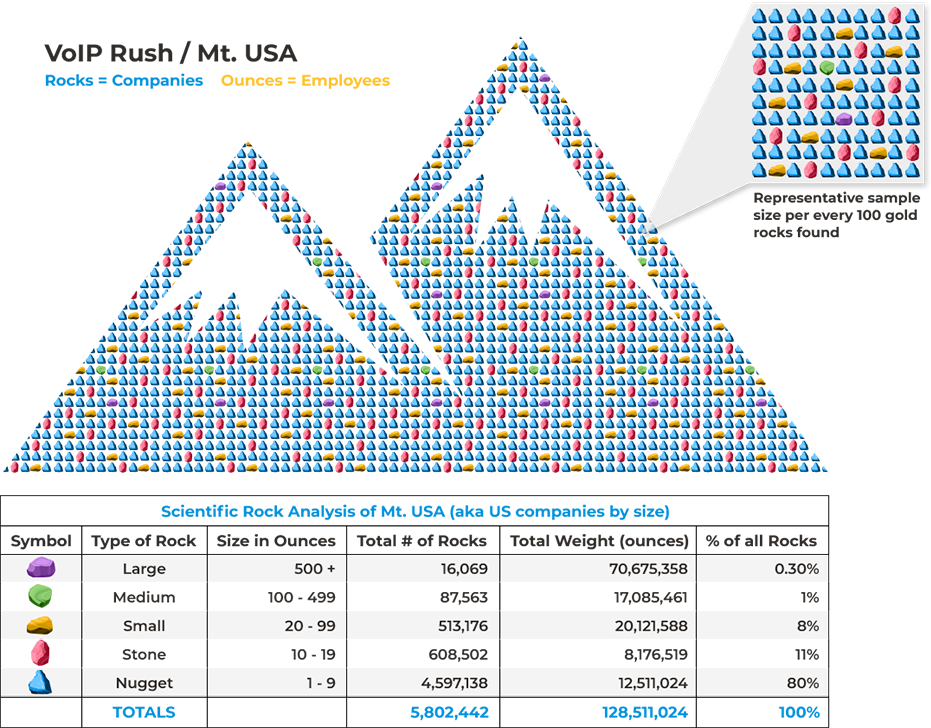The Very Small Business and the Modern VoIP Market
There’s an often-ignored segment of the VoIP market that needs to be on your radar: the very small business (VSB). These businesses have fewer than 20 employees, but while they are small, they are mighty. 5.2 million-mighty in fact – comprising 90% of U.S. businesses.
Read on to discover what VSBs have to do with the VoIP Rush of 2023 and the growth of your MSP business.

First, the Setting:
The VoIP Rush of 2023
In 1848, gold was found in a small town in California, spurring a westward migration of roughly 300,000 people. This was the Gold Rush of 1848, which eventually yielded a total of 750,000 pounds of gold for prospectors. Initially, most gold was found on the ground and in streams by individuals. Later, machinery and large companies were needed to excavate the “motherlode” found deep in the mountains. During the Gold Rush, there were several ways to get rich – some easier than others.
Fast forward to today, and we find ourselves in the modern equivalent: the VoIP Rush of 2023. VoIP has been around since the 1990s. While VoIP isn’t new, advances in technology have driven its recent growth in adoption. The VoIP market is on a rapid rise. According to Global Market Insights, it’s set to hit $55 billion by 2025 – nearly tripling in size from $20 billion in 2018.
These factors are the drivers behind the VoIP Rush:

Wireless internet is driving demand. VoIP once required users to have a physical connection to the internet to make calls, but advances in technology now support mobility making the VoIP market as we know it poised for expansion. The GMI report notes that the computer-to-computer VoIP sector will see over a 10% compound annual growth rate (CAGR) through 2025, and the domestic VoIP sector will see over 12%. With the refinement of softphone apps, the mobile VoIP sector, meanwhile, will see over 13%.

Geographic growth. VoIP is increasingly used wherever internet access is available, including Wi-Fi. While the North American market share is set to be over 40% for the 2025 period according to GMI, the Asia-Pacific industry market is expected to see a CAGR of over 15%.

VoIP services are more than voice. A report from Persistence Market Insights (PMI) puts the global VoIP service market’s revenue much higher than GMI’s prediction – projecting a combined total of $194.5 billion by the end of 2024. This may owe to some differences in PMI’s use of the term “VoIP services,” which includes other services that GMI’s figures don’t account for such as session initiation protocol (SIP) trunking, VoIP hardware, and other related components.
In other words, now is the time to sell VoIP services and get a piece of the growing VoIP market. The best way to do that is to focus your efforts on the VSB.
The Very Small Business:
The Real Motherlode in the VoIP Rush
Why set your sights on businesses with 1-19 employees?
There’s more to those very small businesses than meets the eye:

VSBs added 1.1 million net jobs in 2015 while small businesses with 20-99 employees saw gains of only about 400,000 net jobs.

With 5.2 million VSBs out there (versus just 500,000 small businesses), VSBs topple the opportunity available with the small companies by a ratio of 10:1.

While both the very small and small business markets each employ approximately 20 million people, MSPs looking at the small market for the lion’s share will come up short.
MSPs should reconsider their strategy of targeting companies with more than 20 employees simply because those businesses have greater headcounts. It might seem to make sense to sell to companies with more employees since the more employees there are, the more phones you’ll sell. But, at the end of the day, you’re selling to companies, not employees.
Additionally, there’s more competition for the customers with more employees – especially ones with 50-99 employees. You’ll come up against more MSPs like you selling to those businesses because most MSPs aren’t looking at the VSB market – they’re looking at the “larger” small business.

VSBs Have Different Pain Than Small Businesses
Small businesses and VSBs are two entirely different markets with different messaging, buyer personas, and buyer journeys. Think about these factors that distinguish businesses with fewer than 20 employees from businesses with 20 to 100:

While at a typical small business there may be one or more people in dedicated IT roles, an IT person at a VSB is rare. One of the major challenges faced by VSBs is understanding which technologies are actually necessary – let alone how to acquire them at the right price.

Businesses with 20+ employees usually have a team of decision-makers while a VSB’s decision-making process is typically driven by the business owner.

VSBs often don’t have the flexibility to scale up or down quickly as their needs change. This makes them good candidates for solutions such as VoIP that give them the easy scalability they need.

Because of their size, most VSBs operate under tighter budgets than even their slightly larger counterparts. Any solution an MSP offers that could create cost savings would be a valuable investment for a VSB.

Because of the absence of an IT department, leaders of VSBs often wear more hats than they’re qualified to wear. MSPs can alleviate some of the pressure this creates – especially in the arena of technology and communications

With so few employees, it can be difficult for a VSB to keep up with the demands of customers while learning, understanding, and utilizing advanced technology. This dilemma means VSBs need solutions that are simple and user-friendly but also allow them to look bigger than they really are.

Further differences also fall in the MSP’s favor: VSBs won’t care much about your lack of Cisco certifications if they even know what they are. They are looking for someone to take on the burden of managing their technology, and they likely have very little understanding of how it all works. They’re in need of a sticky, long-term partner who will be there for their growth. And – as we’ve seen in the VoIP market stats – they’ll be a large part of the surge in VoIP usage. If you’re looking for the motherlode in the VoIP Rush of 2023, look at the VSB.
VSBs Need VoIP – Here’s What You Need to Know to Sell It
To mine those nuggets of VSB gold, you need to understand what you’re working with. VSBs are faced with very specific challenges:

Finding the right technology for the right price. The same technologies that support the growth of an enterprise or even a slightly larger small business might not be the right fit for a VSB. And those VSB customers that have identified the technologies they need may still struggle to acquire them at a price they can afford.
MSPs are positioned to leverage expertise and vendor relationships to identify the best technologies to meet a VSB’s needs and to align them with a vendor that meets their requirements at an affordable cost.

Balancing the number of technology tools with the number of employees. The small number of employees at a VSB doesn’t mean the technology requirements to keep up with competitors are small as well. Cloud phones and unified communications, for example, can facilitate ease of communication among employees and customers so the VSB is able to deliver excellent service.
When working with a VSB customer, it’s important to understand what the technologies they purchase will be used for and by whom. VSBs often require expert guidance to help find the balance between the technologies they invest in and how many employees that investment will ultimately benefit.

Seeming large with limited resources. Many VSBs find themselves in the position of needing to prove they are no less capable than their larger competitors. One of the best ways for them to accomplish this is to be more available to their own customers – something that can be achieved with technologies such as VoIP. With features including virtual receptionist, “find me, follow me,” and mobile integration, cloud phone systems allow VSBs to be instantly available to their clients – giving the impression that the business is larger than it is.
It’s clear that VSBs need VoIP. Connect the benefits of VoIP services to the specific challenges of the VSB, and you’ll find your gold mine in the VoIP market. With the right selling points in mind, convincing one decision maker at a VSB is actually far less complicated than convincing a panel at a larger business.
Remember these points when developing your VSB sales strategy:

VSBs need a phone system that helps simplify communications while
simultaneously making them appear to be larger than they really are. Cloud phone features such as Virtual Receptionist and find-me, follow-me make it easier for a VSB to provide superior service to its customers than a legacy system would.

Overcoming the perception that a VSB is less capable than its competitors
because of size is a universal challenge among these particularly small
businesses. VoIP systems have features such as mobile device integration, which allows your VSB customers to make themselves more readily available to their clients and ultimately helping the cause of seeming like a larger company. With VoIP, you can always be available, no matter where you are.

Go Big in the VoIP Market With the Very Small Business
In the VoIP Rush of 2023, the best strategy is to focus on VSBs. These especially small companies need the benefits VoIP service has to offer. All you have to do to make VoIP sales is teach your VSB customers how VoIP addresses their unique pain points.
The real motherlode in the VoIP Rush lies in the
90% of businesses with fewer than 20 employees.
Take advantage of the VSB opportunities that are waiting for you in the 2023 VoIP market. You can do this with a white-label, cloud-based phone and unified communications provider that cares about your growing business. That provider shouldn’t take you hostage with termination penalties or put a gun to your head with minimum revenue requirements and additional support charges.
D3UC offers a cloud phone solution to MSPs looking to strike it rich, but we don’t profit off your struggle mining for VSB sales like the historical suppliers of the Gold Rush. We recognize that in the actual Gold Rush of 1848, many of the small prospectors did not get rich and were taken advantage of by suppliers. In this analogy with the VoIP Rush of 2023, MSPs that work with D3UC do not find such a fate.
Instead, D3UC’s only customers are very small MSPs with fewer than 20 employees. We can only be successful if our very small MSPs are successful prospectors in the VoIP Rush. Just as in the Gold Rush, there are VoIP suppliers today who don’t care about very small MSPs. They are merely looking to fatten their wallets and won’t be hurt if MSPs fail in finding gold. We are quite the opposite.

We offer tools and resources to our MSPs so they are ensured success in their sales journeys. To get ahead of the other prospectors in the VoIP Rush and to discover how we’re your faithful partner in mining, get in touch with us.

